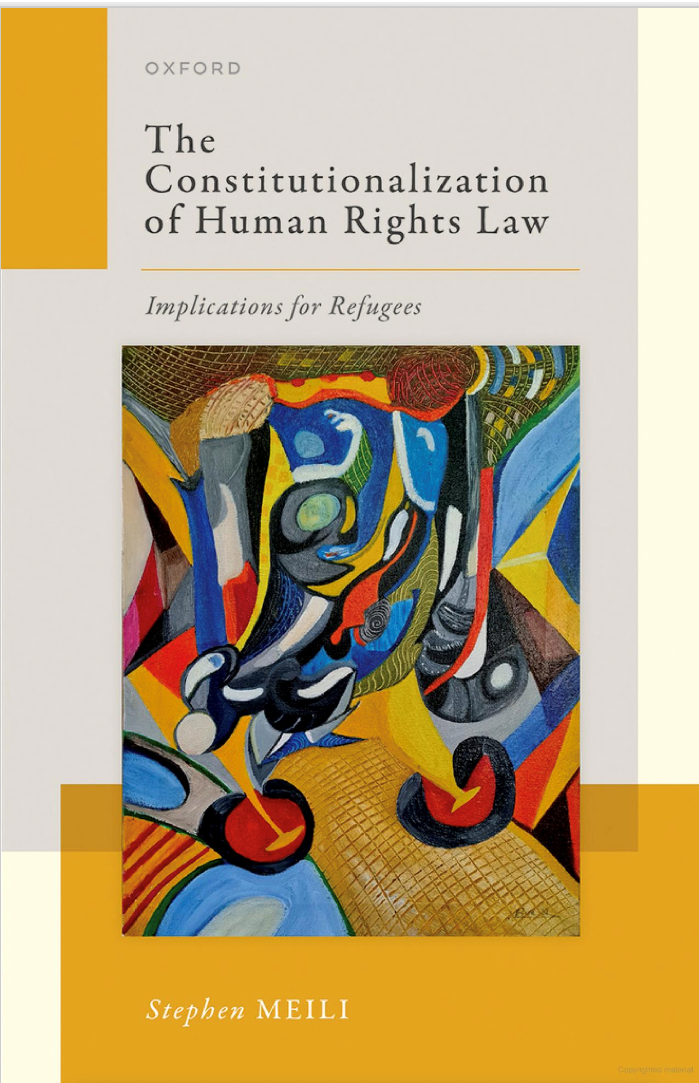Stephen Meili, The Constitutionalization of Human Rights Law: Implications for Refugees Book Launch
Speaker(s):
Series:
Notes & Changes
Students on the MSc in International Human Rights Law and students on the Oxford/GWU Summer School in International Human Rights Law have priority but others very welcome subject to space.
If you have any questions about this event, please do not hesitate to email freya.baetens@law.ox.ac.uk.
The Bonavero Institute of Human Rights is delighted to host the launch of the book The Constitutionalization of Human Rights Law, Implications for Refugees, by Prof. Stephen Meili.

The Constitutionalization of Human Rights Law analyses how lawyers representing refugees use human rights provisions in national constitutions to close the gap between the Law and its implementation. Focusing on five countries (Colombia, Mexico, South Africa, Uganda, the United States) the book examines how lawyers adapt creatively to social, political, and legal contexts. Many refugee-receiving states openly reject or passively ignore their obligation under international law to protect refugees. For this reason, cause lawyers (those who use the law to empower others) have turned to constitutionalized human rights law. While many countries likely included such provisions in their constitutions without intending to fulfil their commitments, cause lawyers have seized on them as a more enforceable means of rights protection.
This book theorizes a continuum of ever-more ambitious methods through which cause lawyers use constitutionalized human rights law to benefit refugees. Lawyers use different tools as they move along this continuum, including strategic litigation, training governmental officials in the applicable law, and various forms of informal advocacy. It makes important contributions to three strands of socio-legal literature. As to the effectiveness of human rights treaties, it provides qualitative evidence of how such treaties achieve greater significance when incorporated into national constitutions. As to refugee law, it analyses how international protections for refugees become stronger when domestic lawyers enforce them through national constitutions. And as to cause lawyering, it shows how refugee lawyers use constitutionalized human rights law to protect their clients.
Author

Professor Stephen Meili writes and teaches about the rights of non-citizens, particularly those seeking asylum. His recent publications include a comparative study of the detention of asylum-seekers in the US and the UK (NYU Journal of International Law and Politics 2015), the right not to hold a political opinion as the basis for asylum (Columbia Human Rights Law Review 2015), a human rights-based analysis of US refugee resettlement policy (International Journal of Migration and Border Studies 2016), an evaluation of national constitutions and the right to asylum (The Oxford Handbook of International Refugee Law 2021), a study of the Trump Administration's restrictions on asylum rights and procedures (Buffalo Human Rights Law Review 2020), and an analysis of the effectiveness of human rights treaties in protecting asylum-seekers in Ecuador (Georgetown Immigration Law Journal 2017), the UK (Vanderbilt Journal of Transnational Law 2015) and Canada (Osgoode Hall Law Journal 2014). He has also published extensively on cause lawyering in comparative perspective. His research has been funded by grants from the National Science Foundation and the Robina Foundation. He teaches courses on Immigration Law, Human Rights Law and Legal Practice.
Online profile: https://law.umn.edu/profiles/steve-meili
Discussants

Catherine Briddick is an Assistant Professor in the School of Law at the University of Warwick. Catherine is a scholar of human rights and refugee law who draws on feminist approaches to international law, and legal theorising on intersectionality, to analyse protection, discrimination, and the relationships between them. Her research has been published in leading peer reviewed journals and books, including the International Journal of Discrimination and the Law, ICLQ, and the Oxford Handbook of International Refugee Law (Costello, Foster, and McAdam (eds), OUP 2021). Catherine holds an LLM from the LSE and a doctorate from the University of Oxford. She is a barrister (currently non-practicing) with extensive experience in the legal not-for-profit sector.
Online profile: https://warwick.ac.uk/fac/soc/law/people/catherine_briddick/.

Alexander Betts is Professor of Forced Migration and International Affairs, and Director of the Refugee Studies Centre at the University of Oxford. Most of his current research focuses on the socio-economic rights of refugees. His most recent book is The Wealth of Refugees: How Displaced People Can Build Economies (Oxford University Press, 2021).
Online profile: https://en.wikipedia.org/wiki/Alexander_Betts_(political_scientist)
Moderator

Freya Baetens is Professor of Public International Law at the Faculty of Law, Head of Programmes at the Bonavero Institute of Human Rights and Fellow at Mansfield College. She is also affiliated with the PluriCourts Centre of Excellence (Faculty of Law, Oslo University) and the Europa Institute (Faculty of Law, Leiden University). As a Member of the Brussels Bar, she regularly acts as counsel or expert in international and European disputes.
Online profile: https://www.law.ox.ac.uk/people/professor-freya-baetens
If you have any questions about this event, please do not hesitate to email freya.baetens@law.ox.ac.uk.


 Add to calendar
Add to calendar


